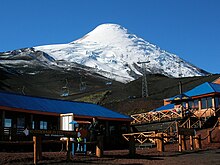Volcan oSponge – Wikipedia, the free encyclopedia
He Osorno Volcano It is a stratovolcán of southern Chile that is located in the Andes mountain range, east of Lake Llanquihue. It is known worldwide for the landscapes that it grants to the entrance door to the Chilean Patagonia, being the most recognizable natural visual icon in the Los Lagos region
Etymology [ To edit ]
This volcano owes its current name because it is indicated that it was visible to the Spanish founders from the relatively close city of Osorno. In colonial times the native population gave different names, such as pure, purehue, prarauque, peripillan, choshueco, oñauca [ 2 ] And Guanauca, these last two names being the most common in the mid -18th century. [ 3 ]
Description [ To edit ]
It has an altitude of 2652 meters and its imposing conical feature, it rises majestic to the opposite side of the cities of Llanquihue and Frutillar, of which only the waters of Lake Llanquihue separate them. Its volcanic inactivity is already extended for more than a century and a quarter. In their skirts there are shelters that allow in the winter the practice of skiing and white sports. In summer, with the melting of snow, volcanic fissures that make hiking a dangerous sport reappear, if all the necessary conditions for the practice of this discipline are not taken into account.
Location [ To edit ]
It is located almost 45 kilometers northeast of Puerto Varas. Its great height makes it possible to see from the entire province of Osorno, even in some places of the Great Island of Chiloé, which constitutes an imposing and typical postcard of the landscape of the region. With his classic blackish green and adorned with arms of eternal snows, his presence attracts thousands of tourists who visit him every year. Looking at its summit is something that hypnotizes and there are the different excursions that try to ascend.
You can access it from Puerto Klocker, Ensenada and Petrohué. At his feet – in the shores of Lake Llanquihue – is the town of the waterfalls.
The promotions last approximately six hours and in most cases groups are assembled by a local guide to start the promotions. The thermal clothes, sun glasses, protective creams, water and, of course, comfortable footwear to be able to climb, in addition to repellent for the tábanos.

Eruptions [ To edit ]
In 1835 Charles Darwin witnessed, from Ancud, of an eruption of the volcano, which recorded, noted and made him suspect the existence of a relationship between the simultaneous activity of geographically distant volcanoes. However, the data on which it was based were, at least in part, wrong, as they reported an eruption in Aconcagua, which was almost impossible, since it is not a volcano, but is a paleovolcán or volcano Extinct:
I have been very surprised to know later than the Aconcagu To the north of Aconcagua, an eruption accompanied by an earthquake that was felt within a radius of 1000 miles, it had taken place six hours later. It is difficult to venture even to conjecture if that coincidence is accidental or if you have to see in it the proof of an underground communication.
It takes number 48 in the Volcano Catalog of the Regional Sismology Center for South America (Ceresis).
On May 8, 2018, the National Geology and Mining Service (Sernageomin) declared “yellow alert” for the volcano due to abnormal internal seismic activity. [ 4 ]
In February 2020, Sernageomin published the Specific risk ranking of active volcanoes from Chile 2019 . The Osorno volcano was classified in the sixth position of a total of 92 active volcanic systems, being in the classification “with a very high level of specific risk.” [ 5 ]
Legends associated with volcano [ To edit ]
According to Mapuche mythology, an old and powerful Pillán named Peripillán (who because he was a great perverse spirit, was banished and thrown to Earth, giving rise to this volcano) inhabits and is prisoner in the Osorno volcano.
The fury of this volcano is also expressed in the legend of Licarayén, legend about how Lake Llanquihue formed.
-
Osorno Volcán seen from the Petrohué jumps
-

Osorno volcano near waterfalls
-

Osorno Volcán seen from the way to Puerto Octay
-

View of the Osorno volcano from Puerto Varas
-

From the Petrohué jumps
See also [ To edit ]
References [ To edit ]
external links [ To edit ]

Recent Comments